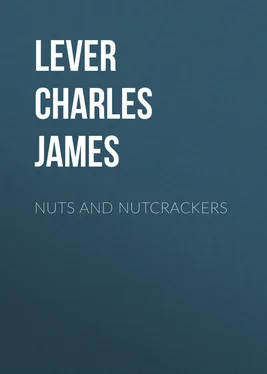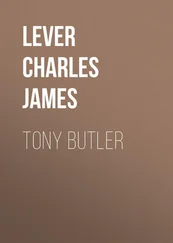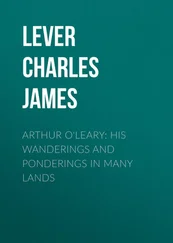Charles Lever - Nuts and Nutcrackers
Здесь есть возможность читать онлайн «Charles Lever - Nuts and Nutcrackers» — ознакомительный отрывок электронной книги совершенно бесплатно, а после прочтения отрывка купить полную версию. В некоторых случаях можно слушать аудио, скачать через торрент в формате fb2 и присутствует краткое содержание. Жанр: foreign_antique, foreign_prose, на английском языке. Описание произведения, (предисловие) а так же отзывы посетителей доступны на портале библиотеки ЛибКат.
- Название:Nuts and Nutcrackers
- Автор:
- Жанр:
- Год:неизвестен
- ISBN:нет данных
- Рейтинг книги:5 / 5. Голосов: 1
-
Избранное:Добавить в избранное
- Отзывы:
-
Ваша оценка:
- 100
- 1
- 2
- 3
- 4
- 5
Nuts and Nutcrackers: краткое содержание, описание и аннотация
Предлагаем к чтению аннотацию, описание, краткое содержание или предисловие (зависит от того, что написал сам автор книги «Nuts and Nutcrackers»). Если вы не нашли необходимую информацию о книге — напишите в комментариях, мы постараемся отыскать её.
Nuts and Nutcrackers — читать онлайн ознакомительный отрывок
Ниже представлен текст книги, разбитый по страницам. Система сохранения места последней прочитанной страницы, позволяет с удобством читать онлайн бесплатно книгу «Nuts and Nutcrackers», без необходимости каждый раз заново искать на чём Вы остановились. Поставьте закладку, и сможете в любой момент перейти на страницу, на которой закончили чтение.
Интервал:
Закладка:
Charles James Lever
Nuts and Nutcrackers
AN OPENING NUT
“An Opening Nut.”
This is the age of popular delusions! Everybody endeavours to be somebody else, and everything is made to resemble something it is not. Every class and section of society seeks to mystify the other, and the whole world is masquerading it, very much it would seem to the whole world’s delight. There are people who think the Tories consistent – the Whigs honest – and the Repealers respectable. Nothing too palpable in absurdity not to have its followers; nor does the ridicule cease with ourselves; but all who visit us catch the malady – witness the Indian Chiefs, who called on Ben. D’Israeli, to see the style of life and habits of the English Aristocracy.
These things after all are but poor delusions – little better than what the Wizard of the North calls “Parlour Magic,” and might be left to time, to be laughed at, just like the French war clamour – the O’Connell denunciation – or the Young England discovery of the “pure ‘Cocktailian’ race.” There are, however, other fallacies which from age and habit have gradually associated themselves with our social existence, and become, as it were, national. To disabuse the world of some of these, has been my object in the present little volume. To endeavour not only to show that we often
“Compound for sins we are inclined to,
By damning those we have no mind to;”
but also, that our laws and institutions – our manners and customs – are based less upon principles of justice, than mere convenience and social advantage.
That such an undertaking will be graciously received or kindly acknowledged, I have never been able to persuade myself; no more than I feel disposed to believe, that hunger can be fed by Acts of Parliament; or starvation alleviated by Cricket or Jack in the bowl; however, it is my way of regenerating the land, and why should n’t I “roll my tub” as well as my neighbours. Why I have given the volume its present title, would be perhaps more difficult to account for, save, that I have remarked on so many classes and gradations of people; and that, “Knocks” at our neighbours are generally “Nuts” to ourselves.
A NUT FOR MEN OF GENIUS
If Providence, instead of a vagabond, had made me a justice of the peace, there is no species of penalty I would not have enforced against a class of offenders, upon whom it is the perverted taste of the day to bestow wealth, praise, honour, and reputation; in a word, upon that portion of the writers for our periodical literature whose pastime it is by high-flown and exaggerated pictures of society, places, and amusements, to mislead the too credulous and believing world; who, in the search for information and instruction, are but reaping a barren harvest of deceit and illusion.
Every one is loud and energetic in his condemnation of a bubble speculation; every one is severe upon the dishonest features of bankruptcy, and the demerits of un-trusty guardianship; but while the law visits these with its pains and penalties, and while heavy inflictions follow on those breaches of trust, which affect our pocket, yet can he “walk scatheless,” with port erect and visage high who, for mere amusement – for the passing pleasure of the moment – or, baser still, for certain pounds per sheet, can, present us with the air-drawn daggers of a dyspeptic imagination for the real woes of life, or paint the most commonplace and tiresome subjects with colours so vivid and so glowing as to persuade the unwary reader that a paradise of pleasure and enjoyment, hitherto unknown, is open before him. The treadmill and the ducking-stool, “ me judice ” would no longer be tenanted by rambling gipsies or convivial rioters, but would display to the admiring gaze of an assembled multitude the aristocratic features of Sir Edward Bulwer Lytton, the dark whiskers of Disraeli, the long and graceful proportions of Hamilton Maxwell, or the portly paunch and melodramatic frown of that right pleasant fellow, Henry Addison himself.
You cannot open a newspaper without meeting some narrative of what, in the phrase of the day, is denominated an “attempted imposition.” Count Skryznyzk, with black moustachoes and a beard to match, after being a lion of Lord Dudley Stuart’s parties, and the delight of a certain set of people in the West-end – who, when they give a tea-party, call it a soiree , and deem it necessary to have either a Hindoo or a Hottentot, a Pole, or a Piano-player, to interest their guests – was lately brought up before Sir Peter Laurie, charged by 964 with obtaining money under false pretences, and sentenced to three months’ imprisonment and hard labour at the treadmill.
The charge looks a grave one, good reader, and perhaps already some notion is trotting through your head about forgery or embezzlement; you think of widows rendered desolate, or orphans defrauded; you lament over the hard-earned pittance of persevering industry lost to its possessor; and, in your heart, you acknowledge that there may have been some cause for the partition of Poland, and that the Emperor of the Russias, like another monarch, may not be half so black as he is painted. But spare your honest indignation; our unpronounceable friend did none of these. No; the head and front of his offending was simply exciting the sympathies of a feeling world for his own deep wrongs; for the fate of his father, beheaded in the Grand Place at Warsaw; for his four brothers, doomed never to see the sun in the dark mines of Tobolsk; for his beautiful sister, reared in the lap of luxury and wealth, wandering houseless and an outcast around the palaces of St. Petersburg, wearying heaven itself with cries for mercy on her banished brethren; and last of all, for himself – he, who at the battle of Pultowa led heaven-knows how many and how terrific charges cf cavalry, – whose breast was a galaxy of orders only out-numbered by his wounds – that he should be an exile, without friends, and without home! In a word, by a beautiful and highly-wrought narrative, that drew tears from the lady and ten shillings from the gentleman of the house, he became amenable to our law as a swindler and an impostor, simply because his narrative was a fiction.
In the name of all justice, in the name of truth, of honesty, and fair dealing, I ask you, is this right? or, if the treadmill be the fit reward for such powers as his, what shall we say, what shall we do, with all the popular writers of the day? How many of Bulwer’s stories are facts? What truth is there in James? Is that beautiful creation of Dickens, “Poor Nell,” a real or a fictitious character? And is the offence, after all, merely in the manner, and not the matter, of the transgression? Is it that, instead of coming before the world printed, puffed, and hot-pressed by the gentlemen of the Row, he ventured to edite himself, and, instead of the trade, make his tongue the medium of publication? And yet, if speech be the crime, what say you to Macready, and with what punishment are you prepared to visit him who makes your heart-strings vibrate to the sorrows of Virginius , or thrills your very blood with the malignant vengeance of Iago? Is what is permissible in Covent Garden, criminal in the city? or, stranger still, is there a punishment at the one place, and praise at the other? Or is it the costume, the foot-lights, the orange-peel, and the sawdust – are they the terms of the immunity? Alas, and alas! I believe they are.
Burke said, “The age of chivalry is o’er;” and I believe the age of poetry has gone with it; and if Homer himself were to chant an Iliad down Fleet Street, I ‘d wager a crown that 964 would take him up for a ballad-singer.
Читать дальшеИнтервал:
Закладка:
Похожие книги на «Nuts and Nutcrackers»
Представляем Вашему вниманию похожие книги на «Nuts and Nutcrackers» списком для выбора. Мы отобрали схожую по названию и смыслу литературу в надежде предоставить читателям больше вариантов отыскать новые, интересные, ещё непрочитанные произведения.
Обсуждение, отзывы о книге «Nuts and Nutcrackers» и просто собственные мнения читателей. Оставьте ваши комментарии, напишите, что Вы думаете о произведении, его смысле или главных героях. Укажите что конкретно понравилось, а что нет, и почему Вы так считаете.












